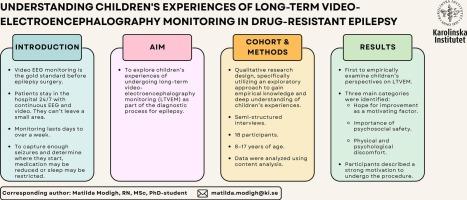了解儿童长期视频脑电图监测耐药癫痫的经验
IF 2.3
3区 医学
Q2 BEHAVIORAL SCIENCES
引用次数: 0
摘要
目的探讨儿童长期视频脑电图监测(LTVEM)作为癫痫诊断的经验。方法:本研究采用质性研究设计,具体运用探索性方法获取实证知识,深入了解儿童体验。对18名最近接受LTVEM治疗的8-17岁儿童进行了半结构化访谈。数据采用内容分析法进行分析。结果:本研究首次实证检验了儿童对LTVEM的看法。研究确定了三个主要类别:希望改善作为激励因素,心理社会安全的重要性,以及身体和心理不适。与预期相反,孩子们可能会发现24/7的监控是一种侵扰或痛苦,参与者描述了接受这种程序的强烈动机,希望得到诊断并实现癫痫控制。这种使命感战胜了住院期间的短期不适,包括身体限制、睡眠中断和情绪困扰。儿童认为LTVEM是迈向更好健康的必要步骤,甚至是授权步骤,表明对医疗保健系统的相当信任。值得注意的是,无论孩子的年龄如何,有监护人的陪伴一直被认为是情感安全的必要条件。意义:本研究结果对LTVEM儿童的经历和应对策略提供了重要的见解。了解这些观点可以通过促进以儿童为中心的护理和改进儿科LTVEM入院计划来为临床实践提供信息。研究结果还支持制定反映儿童声音和需求的国家指导方针,确保获得更具支持性和个性化的护理体验。本文章由计算机程序翻译,如有差异,请以英文原文为准。

Understanding Children’s experiences of Long-Term Video-Electroencephalography monitoring in Drug-Resistant epilepsy
Objective
To explore children’s experiences of undergoing long-term video-electroencephalography monitoring (LTVEM) as part of the diagnostic process for epilepsy. Methods: This study employed a qualitative research design, specifically utilizing an exploratory approach to gain empirical knowledge and deep understanding of children’s experiences. Semi-structured interviews were conducted with 18 children aged 8–17 years who had recently undergone LTVEM. Data were analyzed using content analysis. Results: This study is the first to empirically examine children’s perspectives on LTVEM. Three main categories were identified: Hope for improvement as a motivating factor, The importance of psychosocial safety, and Physical and psychological discomfort. Contrary to expectations that children might find monitoring 24/7 intrusive or distressing, participants described a strong motivation to undergo the procedure, embedded in the hope of receiving a diagnosis and achieving seizure control. This sense of purpose outweighed the short-term discomforts of hospitalization, including physical restraints, sleep disruptions, and emotional distress. Children viewed LTVEM as a necessary and even empowering step toward better health, demonstrating considerable trust in the healthcare system. Notably, being accompanied by a guardian was consistently described as essential for emotional safety, regardless of the child’s age. Significance: These findings offer critical insight into the experiences and coping strategies of children undergoing LTVEM. Understanding these perspectives can inform clinical practice by promoting child-centered care and improving the planning of pediatric LTVEM admissions. The results also support the development of national guidelines that reflect the voices and needs of children, ensuring more supportive, individualized care experiences.
求助全文
通过发布文献求助,成功后即可免费获取论文全文。
去求助
来源期刊

Epilepsy & Behavior
医学-行为科学
CiteScore
5.40
自引率
15.40%
发文量
385
审稿时长
43 days
期刊介绍:
Epilepsy & Behavior is the fastest-growing international journal uniquely devoted to the rapid dissemination of the most current information available on the behavioral aspects of seizures and epilepsy.
Epilepsy & Behavior presents original peer-reviewed articles based on laboratory and clinical research. Topics are drawn from a variety of fields, including clinical neurology, neurosurgery, neuropsychiatry, neuropsychology, neurophysiology, neuropharmacology, and neuroimaging.
From September 2012 Epilepsy & Behavior stopped accepting Case Reports for publication in the journal. From this date authors who submit to Epilepsy & Behavior will be offered a transfer or asked to resubmit their Case Reports to its new sister journal, Epilepsy & Behavior Case Reports.
 求助内容:
求助内容: 应助结果提醒方式:
应助结果提醒方式:


